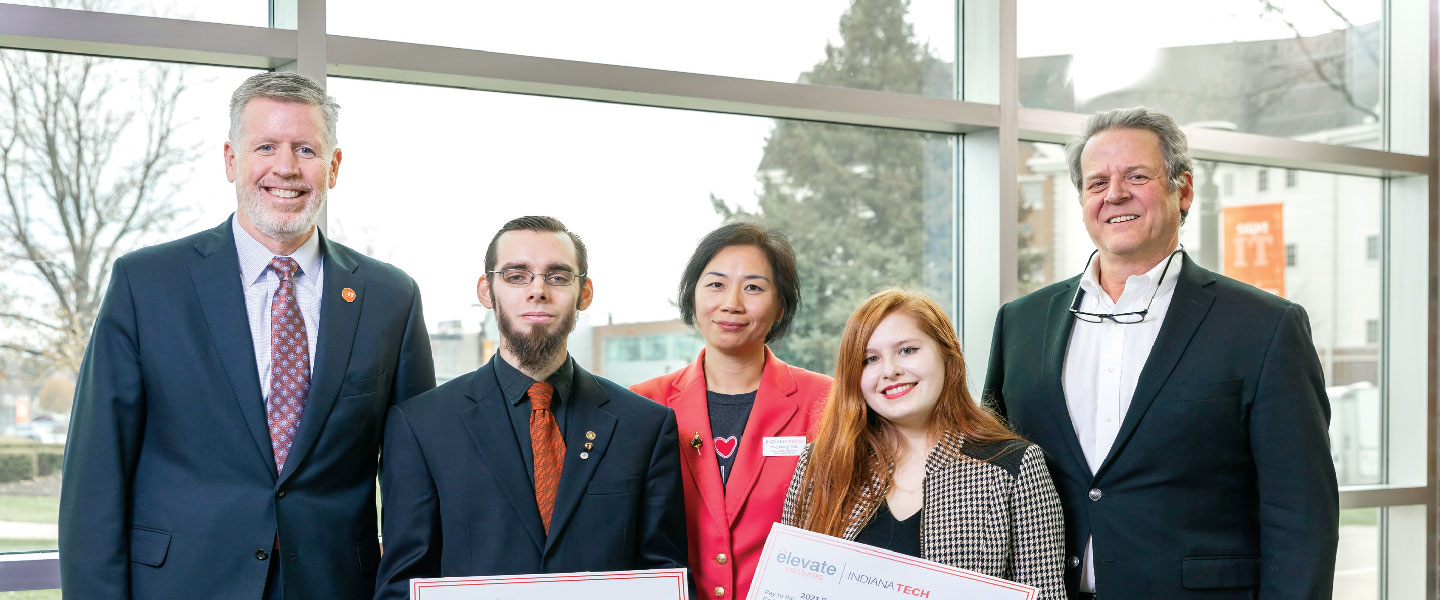Engineering Innovation Challenge Fosters Student Entrepreneurs
Student competition made possible through grant from Elevate Ventures
Indiana Tech recently held the university’s first-ever Engineering Innovation Challenge competition, designed to encourage and support students in turning innovative ideas into viable business opportunities. The competition and the grants awarded to the winning student entrepreneurs were made possible through grant funding provided by the Elevate Nexus program of Elevate Ventures.
A total of seven teams of Indiana Tech students submitted projects as part of the inaugural competition. While this first competition focused on innovation in engineering, the competition is open to Indiana Tech’s three colleges—engineering and computer sciences, business, and arts and sciences.. During the first round of competition, students presented their business plans to a panel of faculty and staff members from across the university. Two finalists were then chosen to present their business concepts to Indiana Tech’s Board of Trustees during their quarterly meeting on Dec. 3, 2021. Board members heard each business pitch and took part in Q&A sessions with each student entrepreneur, and then convened to vote on the first-place and second-place winners.
Chosen by the board as the first-place winner was Zollner Motorsports. Indiana Tech engineering student David Roach presented to the board on behalf of a team of students from a variety of academic programs, pitching their idea to start an Indiana Tech student motorsports team, to be named Zollner Motorsports. The motorsports team received a $2,000 grant for being selected first.
Zollner Motorsports grew out of a senior project group formed by six students in the spring of 2021. The group was formed to start the design and engineering for an FSAE (Formula Society of Automotive Engineers) car. FSAE is an SAE-sanctioned student competition. Teams from schools around the world test their engineering, logistics and teamwork to produce a functional motor vehicle. In total, the team now has 22 student members from various degree programs around Indiana Tech.
Earning second place was electrical engineering and computer science student Alex Forsythe. Ms. Forsythe presented her business plan to develop, license and sell fully functional Star Wars Mouse Droids to Star Wars collectors and robotics enthusiasts. She received a $1,000 grant to support her work in launching the business.
Currently, there are no life-size, fully functional Mouse Droids on the market to serve the large number of U.S. households—one in every four—that collect Star Wars memorabilia. Forsythe, who designed and built her own R2-D2 droid, and has been a designer, builder and seller of electronic control boards for similar droid-building projects, sees an opportunity to further enter the Star Wars hobbyist and collector markets.
Dr. Ying Shang, dean of Indiana Tech’s Talwar College of Engineering and Computer Sciences, noted, “The entries for this first year of the Engineering Innovation Challenge were all impressive. I’m proud of the students who entered, and appreciate the support of the Elevate Nexus Higher Education Grant program in making this new opportunity a reality for them. David and Alex did an excellent job presenting their business plans to our board of trustees. I know it was a difficult decision for the board to pick the first-place winner between the two entries.”
The university plans to continue expanding the Innovation Challenge to encourage even greater participation from students in the years ahead. Ultimately, the goal of the Elevate Nexus program at Tech is to build the culture of innovation and entrepreneurship at the university. In the long run, Indiana Tech seeks to become a go-to place for inventors and for technology-centered entrepreneurship throughout the region. The aim will be to help student entrepreneurs and others convert their ideas and projects into real-world value around which businesses can be built.
As a start, Dr. Shang sees the Innovation Challenge growing over the next few years. She notes, “Ideally, we’ll see more participation among multidisciplinary teams. We plan to expand this to students from our other two colleges as well, most likely partnering with our College of Business first.”
The Elevate Nexus Higher Education Grant also provides support for a range of activity related to innovation and entrepreneurship beyond the Innovation Challenge. Included in the grant are funds for a guest speaker series, travel and entry costs for pitch competitions, and commercialization and other professional services for projects that show business promise.
Dr. Shang concludes by noting, “Our first year of the Innovation Challenge was a success, but there is even more room to grow in the future. Through our three colleges and our Center for Creative Collaboration—the C3—we hope to continue inspiring and collaborating with students to turn their ideas into the successful entrepreneurial ventures of tomorrow. I look forward to seeing the next group of entries in 2022.”
